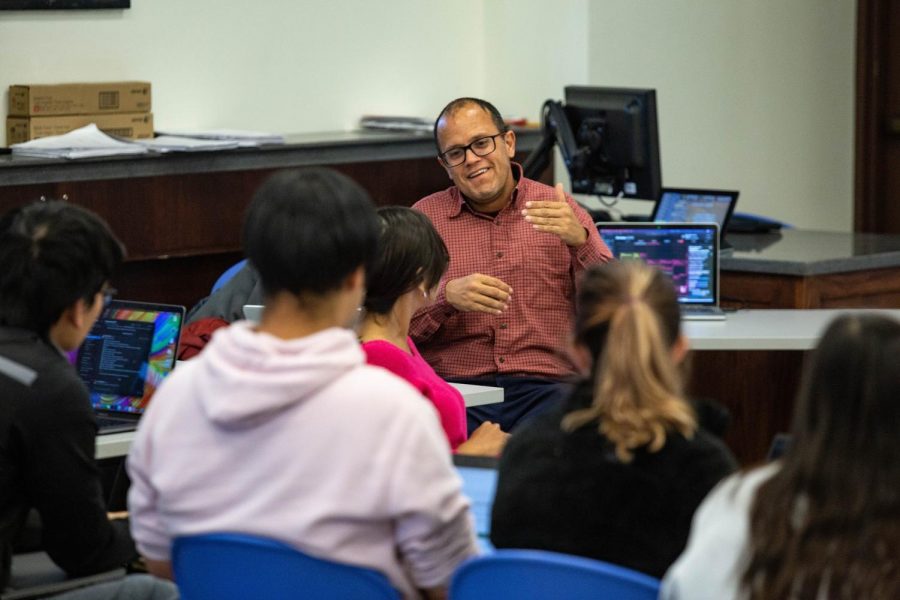Class prepares for disaster relief trip to Puerto Rico
Students create projects to aid in aftermath of Hurricane Maria
Students gather during a discussion session with Professor Rodriguez. Rodriguez is planning a third service trip to Puerto Rico, this time emphasizing community engagement.
Oct 24, 2019
Luis Rodriguez, professor in ACES, was in the process of finalizing plans in fall 2017 for a study abroad tour course to bring students to Puerto Rico when Hurricane Maria hit the island.
Rodriguez, who is from Puerto Rico and has family living there, didn’t hear anything from the island for two weeks following the Category 5 hurricane. Not having plans finalized for the trip, he ultimately met with his students to tell them the class was canceled.
But the response he got from his students paved the way for the class to transition from a study abroad tour to a disaster relief project.
“It was really those students themselves who said, ‘Professor, we need to find a way to do something; this is terrible,’” Rodriguez said. “Very quickly, it was just obvious we had to do it.”
The UIUC Puerto Rico Disaster Relief Program is made up of University students and faculty who travel to Puerto Rico to help with disaster relief efforts following the natural disaster.
Get The Daily Illini in your inbox!
The agricultural and biological engineering class, ABE 498, has made two trips to Puerto Rico, this past spring and in spring 2018. The class is preparing for its upcoming trip set for winter break.
Students in the class work on projects related to community engagement, engineering and fundraising in preparation for their trip to Puerto Rico, which occurs at the end of the semester.
Daniela Markazi is a senior in ACES and head of engagement and communications for the UIUC Puerto Rico Disaster Relief Program. She has been on both trips with the class.
She said on the first trip, which occurred six months following the hurricane, she witnessed power outages, broken streetlights, fallen trees and abandoned cars throughout the island. On the second trip, there was still a lot of work that needed to be done.
“It still isn’t as good as it should be, especially since it’s been two years since the hurricane happened,” Markazi said. “The island should be in much better condition, but unfortunately it isn’t.”
According to Rodriguez, who leads the class, the objective of the first trip was to analyze and assess infrastructure on the island, while the second trip was focused on designing and implementing solutions.
The class is designed to be completely project-based, where students collaborate to set the agenda and lay out their tasks. Rodriguez’s role is to support that effort and help find resources the class needs.
Some of the engineering projects the class is working on include making microgrids that can offer an energy source for people on the island and removing an invasive flower species called water hyacinths from canals.
For the upcoming trip, the class will further implement solutions but will also create a greater emphasis on community engagement in Puerto Rico.
“While we might make all sorts of great ideas, if the community doesn’t buy in, we really shouldn’t be placing any of those solutions in those communities,” Rodriguez said. “We want to provide solutions that are truly in context of what the community is demanding and what they’re willing to support.”
The students work with two non-profit organizations, Amizade and Caras Con Causa. During the class’s previous trips to Puerto Rico, students worked with Caras Con Causa to plant mangrove trees to help mitigate flooding.
The class is also creating a greater emphasis on fundraising in preparation for the upcoming trip, which involves applying for grants and finding funding opportunities to reduce travel costs.
“What’s really limiting is money, in the end,” Rodriguez said. “Lots of ideas are out there; many of them are very good. Getting them built, getting them implemente, that’s our real challenge.”
Markazi said some of her favorite moments from the trips include witnessing the crystal clear ocean water at the beach and practicing her Spanish with the local people.
While the class will have some time for recreational activities, the purpose of the trip is ultimately about disaster relief.
“I always tell the students, ‘You’re gonna come. You’re gonna work hard. You’ll be hot and sweaty, too, because it’s going to be hot and humid when you’re out there,’” Rodriguez said. “We will take some time to relax a bit as well, but it’s not a vacation. This is a service trip.’”
Rahul Shah, senior in Engineering, will be going on his first trip to Puerto Rico with the class.
“I’m looking forward to just doing the work,” Shah said. “I think going over there and working in the community, and seeing the impact that we can have is something I’ve been wanting to do for a long time.”






